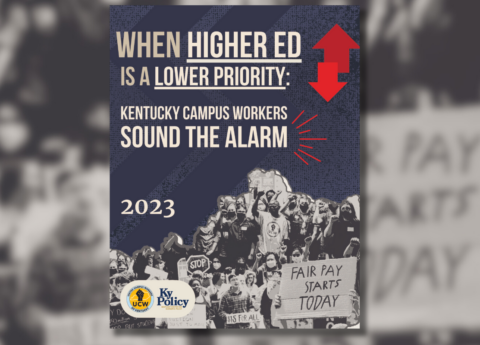The amended version of House Bill 520 — the charter school legislation that passed the House today — rightly prohibits virtual charter schools, but other changes made to the bill raise new issues and concerns. There are big problems and unanswered questions with how the funding for charter schools will work, and funds for existing public schools — which are already stretched thin — continue to be in jeopardy.
Here are some of the changes made in HB 520’s committee substitute:
- Changes that addressed concerns expressed about earlier drafts:
- Virtual charter schools would be prohibited.
- Students who live in one school district could not enroll in a charter school located in another district, unless districts are combined to establish a regional achievement academy, in which case students from all districts within a defined boundary could enroll in the charter school. The language only applies to “one or more contiguous counties, each with four or more local school districts.” Based on this definition, the only counties that would qualify to establish a regional achievement academy are Kenton and Campbell Counties.
- Provisions that cause additional concerns and questions:
- In addition to local school districts serving as the authorizers for charters, the mayors of Louisville and Lexington could be charter school authorizers.
- Other than one provision related to transportation described below, all details about how charter schools would be funded have been removed from the bill. This complete removal of direction about funding raises more questions than it answers because now there is absolutely no guidance about how charter schools will receive money to operate, or what local districts will be required to contribute.
- With no funding provisions included in the bill and mayors being added as potential authorizers, the bill as passed by the House simply doesn’t work if a mayor does authorize a charter school. The mayor does not have access to school district funding, nor does a mayor have the legal ability to require a school district to transfer funds to a charter school. Yet the charter contract is between the authorizer and the charter school.
- Mayors in Kentucky are not in the business of education (this is not the case in some states where mayors serve as authorizers and also are responsible for the school systems); their offices and staffs are not equipped to provide the review and oversight required by the legislation. Nor can a mayor, acting alone, “adopt by resolution all charter approval or denial decisions in an open meeting of the authorizer’s board of directors” as required by the legislation.
- A school district would not be required to provide transportation to a charter school located within the district; however, a new concern is raised because if the district declines to provide transportation, the portion of the SEEK (core funding) money devoted to that purpose must be transferred to the charter school, thus further depleting an already woefully underfunded component of the SEEK formula.
- The general concerns about the strain on funding that charter schools place on public school districts remain under the legislation passed by the House, along with concerns about the inefficiency created by the increased bureaucracy of adding another school with a separate operating structure within the existing system. Our public schools are already underfunded, and charter schools will only exacerbate these issues.
Kentucky needs an approach to education that strengthens our public schools and improves educational opportunities, not one that siphons already-scarce resources and shields them from public accountability.



